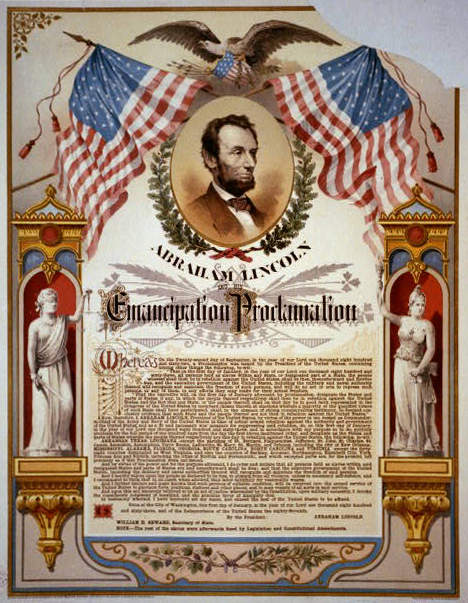 When Hannah Johnson wrote President Lincoln in the summer of 1863, she expressed the concerns of any mother with a son fighting a war.
When Hannah Johnson wrote President Lincoln in the summer of 1863, she expressed the concerns of any mother with a son fighting a war.
But she had a special request: "I am a colored woman and my son was strong and able as any to fight for his country and the colored people have as much to fight for as any.... Will you see that the colored men fighting now, are fairly treated. You ought to do this, and do it at once."
On January 1, 1863, the Emancipation Proclamation became the first authorization by an American president to enroll Johnson's son, and other black men, as legal soldiers for the United States military.
Emancipation and the enlistment of black soldiers were not President Lincoln's initial impulse. He wanted to make a gradual change, as he wrote in this letter explaining his shift to an advisor:
"When, in March, and May, and July 1862 I made earnest, and successive appeals to the border states to favor compensated emancipation, I believed the indispensable necessity for military emancipation, and arming the blacks would come, unless averted by that measure. They declined the proposition; and I was, in my best judgment, driven to the alternative of either surrendering the Union, and with it, the Constitution, or of laying strong hand upon the colored element. I chose the latter."
By the end of the Civil War, black soldiers made up 10% of Union troops, and 19,000 served in the Navy.
"Republicans understood that they needed blacks to be agents of change for the process," said James Oakes, author of "Freedom National: The Destruction of Slavery". "The North couldn't win the war without black soldiers."
Those soldiers, and the proclamation, became an enduring symbol of freedom.
But on the 150th anniversary of the signing of the Emancipation Proclamation, a historical document that symbolizes the beginnings of freedom for individuals once deemed property, historians say myths persist about what the policy did, and did not, do.
"Slavery didn't die on January 1, 1863, but it was the death knell that slavery would die if the Union won the Civil War," said Eric Foner, author of "The Fiery Trial: Abraham Lincoln and American Slavery".
Here are three myths that persist about the Emancipation Proclamation.
Myth 1: President Lincoln freed all slaves with the stroke of a pen.
It is an easy narrative, historians argue, that a single document granted freedom. But that's not how it happened.
Look to the proclamation's language: "That on the first day of January, in the year of our Lord one thousand eight hundred and sixty-three, all persons held as slaves within any State or designated part of a State, the people whereof shall then be in rebellion against the United States, shall be then, thenceforward, and forever free; and the Executive Government of the United States, including the military and naval authority thereof, will recognize and maintain the freedom of such persons, and will do no act or acts to repress such persons, or any of them, in any efforts they may make for their actual freedom."
Freedom only applied to those slaves in states that had seceded. It did not apply to border states, or specific regions in Union control: about 750,000 slaves.
The 13th Amendment later abolished slavery.
Myth 2: President Lincoln was the sole visionary who eliminated slavery via the proclamation.
Lincoln's leadership proved key to signing the document, as seen in the recent blockbuster "Lincoln," which examines the legislation and political process to pass the 13th Amendment.
Review: 'Lincoln' brilliantly dramatizes delicacy of politics
President Obama hailed Lincoln in a proclamation of his own for the document's 150th anniversary:
"With that document, President Lincoln lent new moral force to the war by making it a fight not just to preserve, but also to empower," Obama wrote. "He sought to reunite our people not only in government, but also in freedom that knew no bounds of color or creed. Every battle became a battle for liberty itself. Every struggle became a struggle for equality."
But popular culture, historians argue, often overlooks that questions around slavery had been debated 30 years before the war began, and some say, since the country's inception.
"There is a long pre-history that involves black and white abolitionists. They visualized an end to slavery long before the Civil War, and they struggled to put it on the national agenda," said Manisha Sinha, author of the forthcoming book, "The Slave's Cause". "If you look at the long roots of the abolitionist movement, [they] really made it a central issue of the country even before the war."
Myth 3: Due to limited freedoms, blacks and women were constrained in affecting the change and freedoms outlined in the Emancipation Proclamation.
In fact, despite limited freedoms, many became the agitators to address slavery.
"Despite a prevailing sense among so many white Northerners and politicians that the war's principal aim was to save the Union and not destroy slavery, free and enslaved black people insisted otherwise," said photographer and historian Deborah Willis, a co-author of "Envisioning Emancipation".
Abolitionist Elizabeth Cady Stanton, famed rescuer and spy Harriet Tubman and noted author and lecturer Fredrick Douglass, along with countless other women and blacks, were key in making the country address slavery.
"In many ways, fugitive slaves were architects of their own freedom," Sinha said. "It doesn't take away from Lincoln's role. Emancipation was a huge event; it involved many actors, not the least of which were slaves."
- Home
- News
- Opinion
- Entertainment
- Classified
- About Us
 MLK Breakfast
MLK Breakfast- Community
- Foundation
- Obituaries
- Donate
11-08-2024 11:41 am • PDX and SEA Weather














































































































































































































































































































